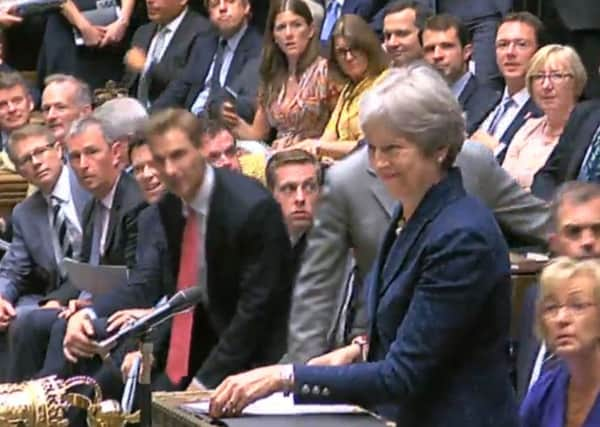The Yorkshire Post says: Theresa May on brink in Brexit mutiny. Resignations rock Government


Though it was Edward Heath who used this mantra when he called – and lost – the 1974 election when industrial strife was at its height, the UK’s relationship with Europe undermined the premierships of Margaret Thatcher, John Major and David Cameron. Now Mrs May faces a similar fate unless the Tories, the supposed party of government, see sense.
Even though many will lament the self-indulgence of Mr Johnson, who has been fortunate to keep his job this long, and Mr Davis, the now former Brexit Secretary, a confidence vote in Mrs May remains a possibility and another unwelcome distraction at a time when the Government needs to be knuckling down and finalising the terms of Britain’s departure from the EU next March.
Advertisement
Hide AdAdvertisement
Hide AdNot even Mrs Thatcher could survive such high-profile resignations towards the end of her premiership and she had a thumping Commons majority. Now the embattled Mrs May, who heads a minority administration, is trying to undertake the sixth Cabinet reshuffle since June 8 last year, when her election gamble backfired.
Yet, while these dramatic resignations very much stem from the Cabinet apparently agreeing a pro-business Brexit at Chequers last Friday rather than a cleaner break from the EU, it’s clear senior politicians are more concerned with their jobs, and future prospects, than those of the people that they still purport to represent.
After all, there are just three months to go until the EU summit in October when Britain’s divorce deal is due to be signed off. Yet, under existing rules, a Tory leadership contest would take this long to reconcile unless an unity candidate emerged – a most unlikely scenario in this febrile period.
And it does not end here. Mrs May is due to represent the UK at this week’s Nato summit where Russian aggression, including the nerve-agent murder case in Salisbury, will feature prominently. She’s also due to host President Trump. What message does this disunity send out?
Advertisement
Hide AdAdvertisement
Hide AdYet two years after the EU referendum, and at a time when this country needs to be confident in its intentions and offering clarity and certainty to global partners, it took only two days for her Cabinet deal to unravel in spite of the Prime Minister’s attempt to put the national interest before the whims of senior Brexiteers who have not had the dexterity to come up with pragmatic ways of implementing their long-held principles.
The culmination was Mrs May trying to sell her Chequers deal to the Commons while being mocked over the disunity and division at the heart of her Government – this is illustrated by the fact that Brexit-supporting Ministers are split on their intentions and ambitions.
Britain deserves better than this – the future of the entire economy is on the line – and the Tory party will not be forgiven if its leading lights continue to undermine Mrs May as she tries to square off her party, Parliament and the EU.